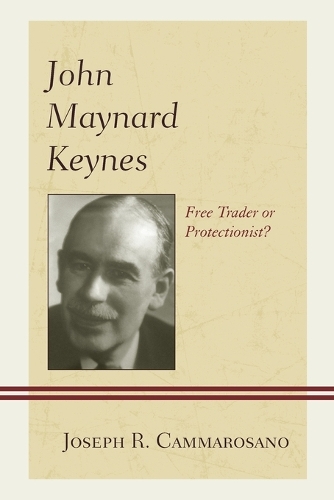
John Maynard Keynes: Free Trader or Protectionist
(Paperback)
Publishing Details
John Maynard Keynes: Free Trader or Protectionist
By (Author) Joseph R. Cammarosano
Bloomsbury Publishing PLC
Lexington Books
25th August 2015
United States
Classifications
Professional and Scholarly
Non Fiction
Econometrics and economic statistics
330.156
Physical Properties
Paperback
220
Width 155mm, Height 229mm, Spine 16mm
349g
Description
Over the course of his professional life, John Maynard Keynes altered his views from free trade in the classical tradition to restricted trade. At the end of his career, his position on the issue was still not categorically resolved even though the evidence seems to suggest that he moved closer to a system of managed trade. In that model,nations would not leave their foreign trade interests open to the vagaries of the free market, but rather exercise some degreeof control over them just as they would their domestic economies. Nevertheless, there is nogeneral agreement among economists as to whether Keynes ended his career in the camp of the free traders or aligned himself with the protectionists. John Maynard Keynes: Free Trader or Protectionist seeks an answer to this question by analyzing Keynes own views on this issue, as stated in his major publications, letters, speeches, testimony before government bodies, newspaper articles, participation in conferences, and other sources. Through this detailed review of what Keynes himself had to say on the issue as opposed to what others have alleged, this book strives to make a significant contribution to the resolution of this issue.
Reviews
Joseph Cammarosano provides a much needed and meticulously researched account of the evolution of Keynes's views on free trade in the broader context of his thoughts on internal and external balance and the international monetary system. He convincingly shows how, despite changes in his views on the matter over time, Keynes was consistent in becoming increasingly more committed to pragmatic trade policies that further social justice and the common good rather than to a dogmatic adherence to free trade. Therefore, when he thought that the conditions for the UK warranted it, Keynes opposed orthodoxy by espousing protectionism. John Maynard Keynes: Free Trader or Protectionist also nicely exposes the vacuity of the widespread branding of those who rebel against free trade fundamentalism with the disparaging label protectionist. -- Amitava Krishna Dutt, University of Notre Dame
Keyness subtle policy shifts on the trade question over time are captured and explained by Cammarosano. The reader gains a grasp of Keyness thought processes and of the economic theory and economic history that fed them. Keynes came to understand that neither perfectly free trade nor protectionism provide all of the needed answers. He sought to balance the long-run advantages of free trade with the short-run advantages of sheltering the domestic economy in the face of less than full employment. -- Jesse T. Richman, Old Dominion University
Author Bio
A veteran of World War II, Joseph Cammarosano has served as an economist in the U.S. Bureau of the Budget and the New York State Department of Taxation and Finance. Cammarosano has also served as professor of economics, vice president of finance, and executive vice president of Fordham University.
